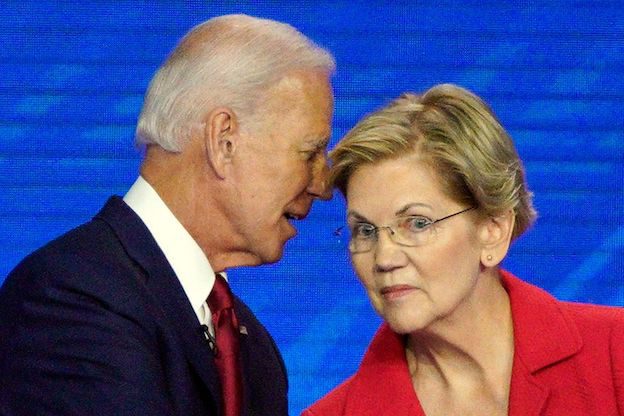
Elizabeth Warren pulls ahead
According to a poll released on Saturday by the most trusted name in Iowa political polling, Ann Seltzer, Massachusetts Senator Elizabeth Warren has pulled into the lead over former Vice President Joe Biden.
Selzer & Co. (9/21, 6/8 in parenthesis):
Joe Biden 20 (24)
Bernie Sanders 11 (16)
Elizabeth Warren 22 (15)
Pete Buttigieg 9 (14)
Kamala Harris 6 (7)
Cory Booker 3 (1)
Amy Klobuchar 3 (2)
Undecided 16 (12)
(MoE: ±4%)
It’s only September now, more than four months until February 3rd, the date of the Iowa caucuses, and the beginning of the people casting ballots portion of the Democratic Presidential nomination process. It’s still early is the point. Things can still change. But what this poll portends is a much shorter nomination process than many expected.
The simple reality is that if Elizabeth Warren, or anyone else for that matter, wins both Iowa and New Hampshire, the whole thing is over except for the confetti drop at the convention.
For an example of this very thing happening we only need to turn our gaze back to the heady days of 2004. Like this cycle, 2004 was a cycle with a lot of candidates competing for the Democratic nomination. It was former Vermont Governor Howard Dean who was leading in the polls, Nationally and in Iowa, in the lead-up to the caucuses. But in a surprise John Kerry won decisively and John Edwards finished second, with Dean finishing a distant third.
Here’s a table of polling averages from before the Iowa caucuses, after the Iowa caucuses and then after the New Hampshire primary:
| Candidate | Pre-Iowa | Post-Iowa | Post-NH |
|---|---|---|---|
| Dean | 23 | 15 | 9 |
| Kerry | 9 | 30 | 48 |
Going into Iowa, Kerry was an afterthought nationally. His Iowa polling had improved quite a bit by the time of the caucuses, but it hadn’t moved at all outside of Iowa. But as the table shows, after winning Iowa Kerry immediately jumps out to a big lead nationally. And after he wins New Hampshire a week later, the race is all but over.
Remember, this was a big field of candidates, like we have now, many of whom were polling much better than John Kerry was before Iowa. Besides Dean; Wesley Clark, Richard Gephardt and Joe Lieberman had all reached double digits in multiple national polls. There were seemingly many viable candidates.
But Kerry’s victory in Iowa changed the whole game overnight.
Most candidates who win Iowa do not go on to win New Hampshire. Ted Cruz and Hillary Clinton won Iowa in 2016 only to lose in New Hampshire. In 2012 Rick Santorum barely beat Mitt Romney in Iowa and lost New Hampshire. In 2008 Barack Obama and Mike Huckabee won Iowa and lost New Hampshire.
John Kerry had the Massachusetts Senator New Hampshire Primary Cheat Code™ going into New Hampshire though. John Kerry was a Senator from neighboring Massachusetts who was already well known to New Hampshirites.
-~-
The power of winning Iowa and New Hampshire has nothing to do with delegates and to even talk about how few delegates are at stake in the two states misses the point of Iowa and New Hampshire.
In a race like this one, with a lot of candidates that have a lot of overlapping constituencies, coupled with an intense desire to defeat the incumbent among all of those constituencies, there is going to be a fairly rapid consolidation of candidate preferences after actual votes start being cast. And whoever wins Iowa stands to be a major beneficiary of that consolidation.
Iowa isn’t important because of its delegates, Iowa is important because it allows candidates to win other states delegates.
The reason I looked at the Democratic primary polling from 2004 instead of 2016 or 2008 is that 2004 seems like a better approximation of the dynamics of this race at this time. In 2008 there were really only two main candidates by the time Iowa came around, same thing in 2016.
In both 2008 and 2016 there was movement in the national polls after Iowa, but not nearly to the degree that there was in 2004. This is likely due to the fact that the race was already basically down to two candidates by the time Iowa rolled around and so there was just not as much room available for movement.
Right now though, in this race in 2019, there are three leading candidates, and another three or so who could conceivably break out of the pack at any time. Like in 2004, many people will abandon their preferred choice if their preferred choice does poorly in Iowa.
And just like in 2004 there is a Senator from Massachusetts who could win in Iowa, use the Massachusetts Senator New Hampshire Primary Cheat Code™, and it could all be over by Super Tuesday.
Thanks for your feedback. If we like what you have to say, it may appear in a future post of reader reactions.


